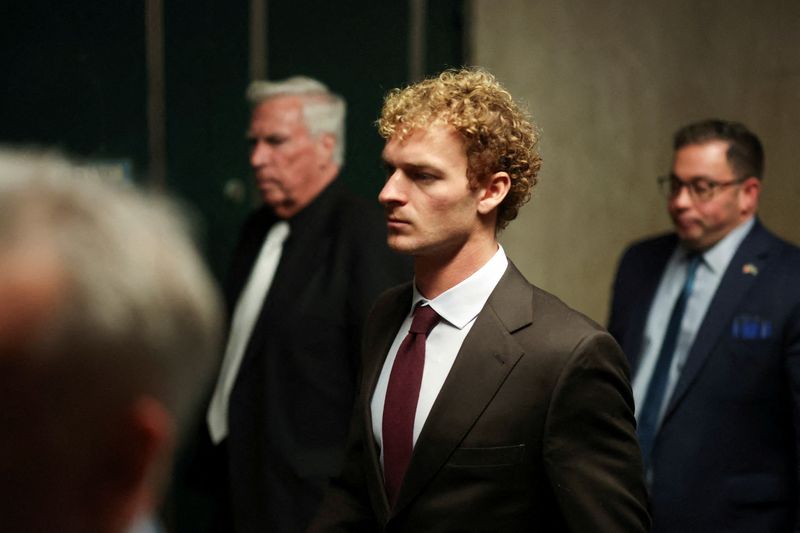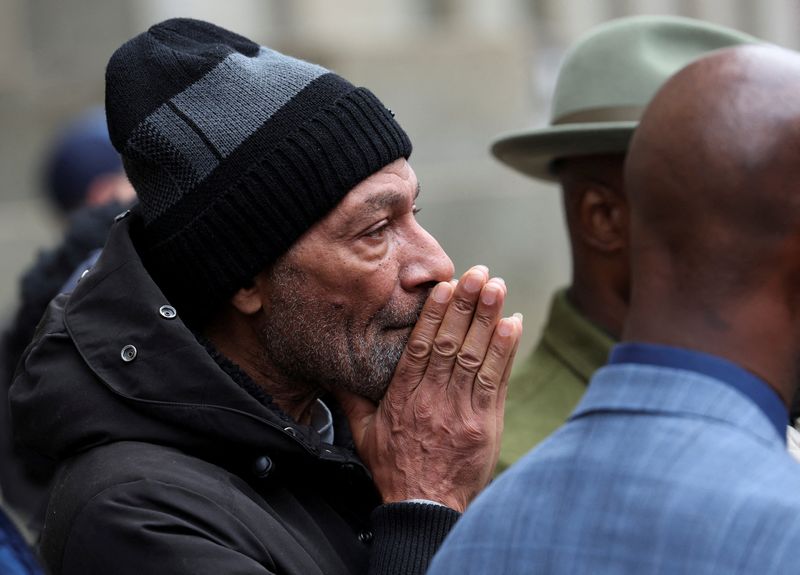By Brendan McDermid
NEW YORK (Reuters) - A former U.S. Marine sergeant who used a chokehold to restrain Jordan Neely, a homeless man, on a New York City subway car was found not guilty of criminally negligent homicide on Monday in Neely's death.
Daniel Penny, 26, has said he never intended to kill Neely, a 30-year-old man with a history of mental illness, during their encounter on an uptown train on May 1, 2023.
Penny did not testify during the trial, which began in October. He left the courtroom without commenting to media.
"I've had enough of this," Neely's father Andre Zachary told reporters outside the courthouse following the verdict. "The system is rigged. Come on people, let's do something about this."
A judge had already dismissed a more serious charge, manslaughter in the second degree, against Penny after jurors emerged twice during their third day of deliberations on Friday to say they were divided on it.
Prosecutors from the Manhattan District Attorney's Office did not dispute that Neely was loud, angry and threatening as he boarded the train, shouting that he was hungry, thirsty and wanted to be sent back to jail.
But they told jurors that Penny, who grabbed Neely from behind with an arm around Neely's neck and brought him to the floor, used deadly physical force without justification and for far longer than necessary.
Dafna Yoran, an assistant district attorney, had said during closing arguments that Penny was warned by people around him about risks to Neely's life and intentionally ignored them.
"He didn't recognize that Mr. Neely, too, was a person," she said. "He didn't care what happened to Mr. Neely."
Penny continued to choke Neely, who was unarmed, on the floor of the subway car for nearly six minutes after the train pulled into the station and other passengers left the car, prosecutors said.
Penny's defense lawyers told jurors that Penny, a student on his way to a gym, acted out of alarm that Neely might hurt a woman and a child he was approaching.
Lawyer Steven Raiser said his client held Neely "until he knew that he was no longer a threat" but did not apply pressure on his airway during the last crucial moments.
"What happened on May 1, 2023 was not a chokehold death," Raiser said. "He was controlling Mr. Neely's body, not choking him."
Penny's lawyer theorized that Neely died from another cause, possibly a drug overdose or a sickle cell crisis. Prosecutor Yoran rejected those scenarios, telling jurors it was extremely rare for sickle cell, a genetic blood disorder, to lead to a fatal crisis, and that it also was unlikely that Neely died from drug overdose at exactly the same moment when he was being held in a chokehold.
The killing gained widespread public attention, with some viewing Neely, who was Black, as a victim of a white vigilante. Others, including some Republican politicians, called Penny a hero.

Neely family lawyer Donte Mills said Penny's acquittal showed "the system" could not be relied on.
"Everyone who's pissed off about this verdict, I challenge you to go outside today and help one person, that's how we beat the system, that's how we turn this around by being there for one another," Mills told reporters outside the courtroom.
